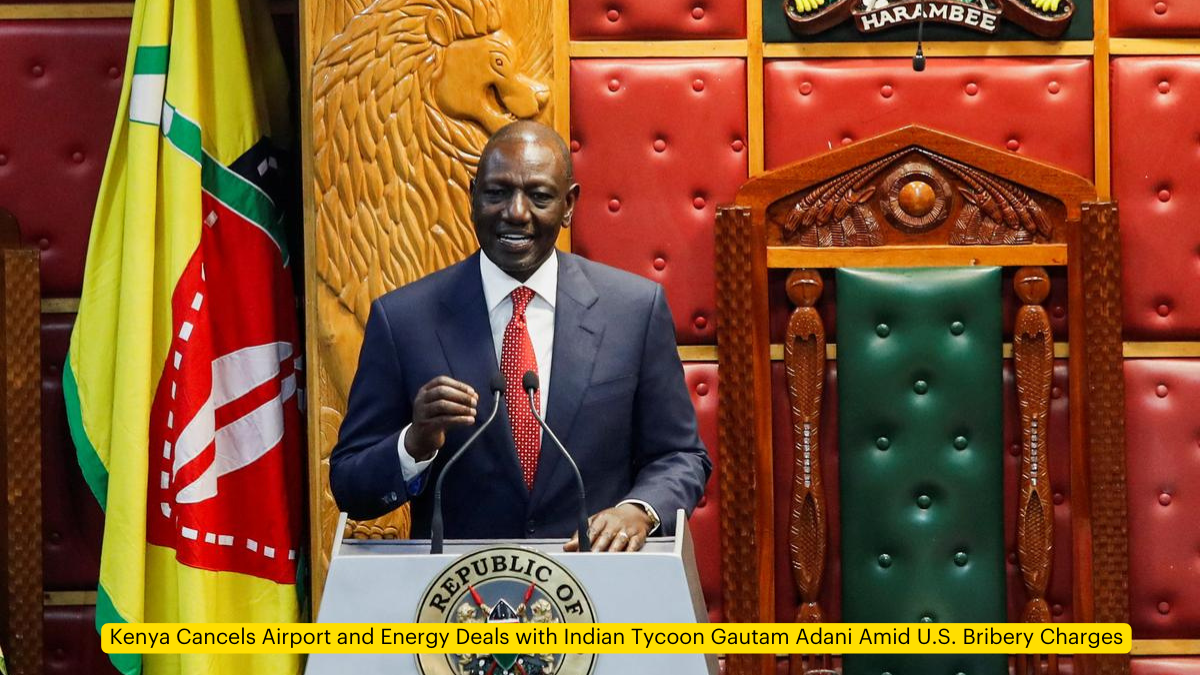Kenyan President William Ruto announced on November 21, 2024, the cancellation of multimillion-dollar deals with Indian business tycoon Gautam Adani, citing concerns over bribery and fraud allegations. The decision follows U.S. indictments against Adani, one of Asia’s richest men, accusing him of securities fraud and a bribery scheme linked to a solar energy project in India.
This announcement comes amid mounting criticism and protests in Kenya, where Adani’s deals were seen as controversial and potentially harmful to workers’ rights and job security.
The Cancelled Deals
Nairobi Airport Modernisation Project
The Adani group had been in negotiations to undertake the modernisation of Kenya’s primary international airport in Nairobi, which included:
- Construction of a new runway and modern terminal facilities.
- A 30-year management deal for the Adani group to operate the airport post-modernisation.
This deal sparked public backlash and anti-Adani protests, with critics arguing that the agreement could lead to:
- Job losses for airport workers.
- Degraded working conditions, as expressed during a strike by airport employees.
Energy Transmission Lines Project
The Adani group had also secured a contract to build power transmission lines in Kenya, a critical infrastructure project for East Africa’s business hub. The deal was part of efforts to enhance Kenya’s energy distribution network.
Reasons for Cancellation
Bribery and Fraud Allegations
President Ruto stated the decision to cancel these deals was made based on new information provided by Kenyan investigative agencies and partner nations. Although he didn’t directly name the United States, the timing aligns with the U.S. indictment of Gautam Adani on charges of:
- Securities fraud related to concealing a bribery scheme.
- Conspiracy to commit securities and wire fraud in connection with a massive solar energy project in India.
Public Pressure and Protests
The airport deal faced widespread opposition in Kenya, including:
- Public demonstrations against Adani’s involvement.
- Worker strikes over fears of job insecurity and deteriorating labor conditions.
Government’s Assurance of Integrity
Kenya’s Energy Minister Opiyo Wandayi, addressing a parliamentary committee, defended the government’s role, stating that no bribery or corruption was involved in signing the now-cancelled energy deal. This highlights Kenya’s effort to distance itself from the allegations facing Adani.
U.S. Indictments Against Gautam Adani
Details of the Charges
The U.S. Department of Justice indicted Gautam Adani this week, alleging:
- Adani misled investors by concealing that a major solar energy project in India was facilitated through bribery.
- Charges of securities fraud and wire fraud conspiracy, portraying Adani as central to an illegal scheme.
Global Implications
The indictment underscores growing international scrutiny of the Adani group’s operations and raises questions about the conglomerate’s global business practices. This case could have broader implications for international trade relations and foreign investment policies.
Impact on Kenya
Economic Considerations
The cancellation of these deals may have immediate and long-term consequences, such as:
- Delays in critical infrastructure projects, including the modernisation of Nairobi’s airport and power transmission lines.
- Potential loss of foreign investment opportunities in Kenya, given the scale of the cancelled agreements.
Public Sentiment
The decision has been largely welcomed by those opposing the deals, who see it as a step toward protecting workers’ rights and ensuring transparency in public contracts.
Summary of the News
| Aspect | Details |
|---|---|
| Why in News | Kenyan President William Ruto announced on November 21, 2024, the cancellation of multimillion-dollar deals with Gautam Adani, citing bribery and fraud allegations linked to U.S. indictments. |
| Cancelled Deals | 1. Nairobi Airport Modernisation Project: Construction of a new runway, terminal, and 30-year management by Adani. 2. Energy Transmission Lines Project: Development of power lines to enhance Kenya’s energy infrastructure. |
| Reasons for Cancellation | – Bribery Allegations: U.S. prosecutors indicted Adani for securities fraud and wire fraud conspiracy in a solar energy project in India. – Public Pressure: Protests and worker strikes in Kenya against job losses and degraded working conditions. |
| Government’s Position | – President Ruto cited new information from investigative agencies. – Energy Minister Opiyo Wandayi denied bribery or corruption on Kenya’s part in signing the deals. |
| U.S. Indictments | – Charges against Adani include misleading investors and bribery linked to a solar energy project. – Raises questions about Adani Group’s global business practices. |
| Impact on Kenya | – Economic Consequences: Delays in airport modernisation and power projects; potential loss of foreign investment. – Public Reaction: Decision praised by critics for protecting workers’ rights and ensuring transparency. |



 Which River is known as the Black River?...
Which River is known as the Black River?...
 Which State is the Largest Producer of C...
Which State is the Largest Producer of C...
 PNB Announces ‘PNB Soldierathon 2026’ Ah...
PNB Announces ‘PNB Soldierathon 2026’ Ah...








